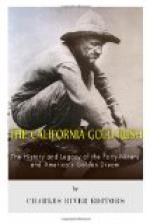In the meantime the hook-and-ladder companies were plying their glorious and destructive trade. A couple of firemen would mount a ladder to the eaves of the house to be attacked, taking with them a heavy hook at the end of a long pole or rope. With their axes they cut a small hole in the eaves, hooked on this apparatus, and descended. At once as many firemen and volunteers as could get hold of the pole and the rope began to pull. The timbers would crack, break; the whole side of the house would come out with a grand satisfying smash. In this way the fire within was laid open to the attack of the hose-men. This sort of work naturally did little toward saving the building immediately affected, but it was intended to confine or check the fire within the area already burning. The occasion was a grand jubilation for every boy in the town—which means every male of any age. The roar of the flames, the hissing of the steam, the crash of the timber, the shrieks of the foremen, the yells of applause or of sarcastic comment from the crowd, and the thud of the numerous pumps made a glorious row. Everybody, except the owners of the buildings, was hugely delighted, and when the fire was all over it was customary for the unfortunate owner further to increase the amount of his loss by dealing out liquid refreshments to everybody concerned. On parade days each company turned out with its machine brought to a high state of polish by varnish, and with the members resplendent in uniform, carrying pole-axes and banners. If the rivalries at the fire could only be ended in a general free fight, everybody was the better satisfied.
Thus by the end of the first period of its growth three necessities had compelled the careless new city to take thought of itself and of public convenience. The mud had forced the cleaning and afterwards the planking of the principal roads; the Hounds had compelled the adoption of at least a semblance of government; and the repeated fires had made necessary the semiofficial organization of the fire department.
By the end of 1850 we find that a considerable amount of actual progress has been made. This came not in the least from any sense of civic pride but from the pressure of stern necessity. The new city now had eleven wharves, for example, up to seventeen hundred feet in length. It had done no little grading of its sand-hills. The quagmire of its streets had been filled and in some places planked. Sewers had been installed. Flimsy buildings were being replaced by substantial structures, for which the stones in some instances were imported from China.
Yet it must be repeated that at this time little or no progress sprang from civic pride. Each man was for himself. But, unlike the native Californian, he possessed wants and desires which had to be satisfied, and to that end he was forced, at least in essentials, to accept responsibility and to combine with his neighbors.




